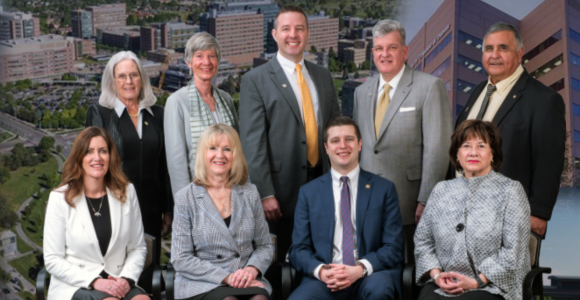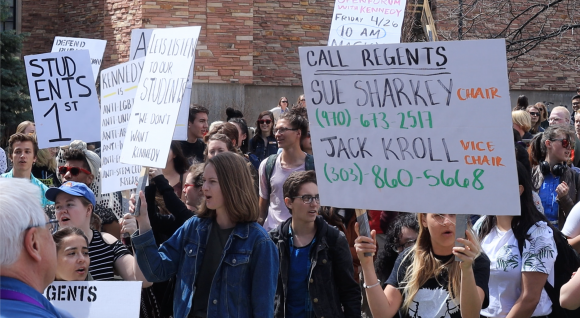
The Board of Regents. (Photo courtesy of University of Colorado)
Following a vote on May 2 by the Board of Regents which ended in Mark Kennedy’s confirmation as the University of Colorado’s next president, regents have called for “unity” as they try to mend a political rift. The vote happened along party lines, with all five Republican regents voting for Kennedy while the four Democrats voted against him. While regents repeatedly attempted to avoid partisan debate, in the weeks leading up to Kennedy’s confirmation, the regents’ political affiliations became more apparent.
In the aftermath of the vote, several regents have spoken with the CU Independent about their decision when it came to Kennedy and their hopes to set politics aside. While some regents feel the board has remained non-partisan, others disagree.
Even before the final vote, regents displayed a political divide. On April 29, Regent Chance Hill (R) broke his silence about Kennedy in a Facebook post. He wrote that Kennedy had endured a “terrible gauntlet of unreasonable attacks, inaccurate news headlines and slanderous smears.” Hill referred to “a few votes [Kennedy] cast” during his time in Congress as the reason for criticism. Kennedy fell under heavy scrutiny for his multiple anti-LGBT votes as well as his anti-abortion stance and lack of support for minority aid and stem cell research. Hill also believed that criticism stemmed from Kennedy’s status as a Republican and wrote that “radical Leftists” had only made “token criticism” against the then-presidential finalist.
Regent Hill was reached out to for comment but provided only his initial statement he made after Kennedy’s confirmation. However, other regents have discussed what is next for the board.
Setting politics aside
Regent John Carson (R) said he feels “great” about his decision to vote for Kennedy’s confirmation.
“I supported him all along,” Carson said, adding that he believes Kennedy brings a mix of “business”, “political” and “academic” experience.
Carson said that Kennedy struck him as a “strategic thinker” and believes that regents and the university need a “clear, strategic vision” for initiatives such as fundraising, research and overall academic excellence. While chancellors of the university’s campuses have had strategic plans before, it has yet to be done by the system president.
Carson said he was “fine” with the opposition that Kennedy faced but believes it is time to “move forward” and ensure that Kennedy is supported in his role. Carson said that in the first three months, Kennedy will be meeting with many constituents of the university. He assured that the role of the president “is not a political role.”
Despite the 5-4 vote along party lines, Carson said that being a regent is not a “partisan position.” Regents are elected by party to represent each of Colorado’s seven congressional districts, with two others elected to represent the state at large. Their political affiliation is included in their title on their main website. Carson said he does not personally see any challenge for keeping regents non-partisan in the future.
“I wasn’t looking for a Democrat or a Republican or an Independent,” Carson said on the presidential search process. “I was looking for someone who could lead the university effectively.”
If anything, Carson sees Kennedy’s experience in Congress as “another skillset” as he will have to work with Gov. Jared Polis to secure state funding.
When asked about his thoughts on the system of electing regents by party, Carson said he prefers it to state appointments as it gives voters a “voice” in the university system. Colorado is one of only four states that appoints its regents through a political vote. Carson said that any person who chooses to take part in the political process will inevitably fall on the spectrum between Republican and Democrat. Carson assured that his politics never interfere with his job as a regent.
“We’re all adults here,” Carson said. “We know when to set politics aside.”
Regent Heidi Ganahl (R) said she is “excited” to work with Kennedy and is pleased with the search process. She assured that the search committee was not partisan which she said is evident from the 9-0 vote by regents to name Kennedy as the finalist. However, she said she couldn’t speak for the four Democrat regents who ultimately voted against Kennedy as she does not believe that the information brought to the regents about Kennedy was anything they “didn’t know.”
Ganahl, like Carson, appreciates that citizens are able to have a voice in the university through regents political elections.
“But I believe the board has to come together for the best interests of the university and the state,” Ganahl said.
When asked about her thoughts on politics in higher education, Ganahl said it is “part of society today” and that “politics is everywhere.”
She said that there will be a lot of “listening, collaborating and working toward a shared vision for CU.” She plans to hold Kennedy accountable, but also believes that students “have a role and responsibility in working collaboratively with the Board of Regents, president and administration to move CU forward.”
“[Kennedy’s] success will be the university’s success, and we all have a stake in that and should work toward that end,” Ganahl said.
While some regents do not believe there will be an issue moving forward, others said that politics may make it harder to unite.

Students hold signs urging others to call the Board of Regents to voice concerns about Kennedy. (Robert Tann/CU Independent)
A partisan board
Regent Irene Griego (D), who has been on the board since 2011, said the “reality” is that the board is political.
“And unfortunately, it becomes very partisan,” Griego added.
She said that board “votes responsibly” most of the time, but that when it comes to a 5-4 vote it is “very obvious” that the decision becomes a political one.
“I personally do not think that we should be making decisions on education and what’s best for our students in the state of Colorado based on any one’s politics,” Griego said. “I think politics should be left at the door and should not be entering into our decision process. But unfortunately, that does not always happen.”
She understands that many states do not elect their regents by party, and believes that partisanship is a drawback for CU’s board. Griego also worries that people can use their status as regent as a “platform” for their political ambitions.
When asked about her decision to vote against Kennedy’s confirmation, Griego said she felt that the board needed to “pause and reevaluate” their decision to put forward a sole finalist for president. Hearing from students and faculty, she knew the various concerns about Kennedy. When she heard that some community members felt that Kennedy’s presidency was a “done deal” even before the final vote, Griego’s perspective on the process changed. Knowing this, Griego said she could not vote for Kennedy.
Ultimately she was “disappointed” that more time was not taken to consider the issues that many were sharing with her and the rest of the board. Still, she knows it is “important to move on” but hopes that student voices “don’t stop.”
“It’s important for regents to hear those voices,” Griego said.
Similar sentiments were shared by her colleague, Regent at Large Lesley Smith (D), who also called the board “quite” partisan.
“I think [uniting the board] is going to be quite challenging actually,” Smith said. “I really do hope we can look more broadly at CU and not focus on a particular agenda.”
Coming from a university system in California with a non-partisan education board, Smith is adjusting to a board where politics plays a bigger role. Smith is the newest member of the board, having begun her term in January. She said that despite how regents are elected, she ran a “non-partisan” campaign. Still, she said that there are benefits to having a board that is independent to the Governor as it allows for more autonomy when it comes to decisions for the university.
Smith acknowledged the heavy amount of press that there has been about the regents and said that they will need to appear “more visible” to students in order to show why they are important.
Following her vote against Kennedy’s confirmation, Smith believes that she made “the right vote.” After reviewing survey data and speaking with colleagues about their concern with Kennedy, Smith decided she would not vote for him. With Kennedy now as president, Smith plans to ensure that he is successful while holding him accountable. Smith mentioned a request made by Joanne Addison, faculty council representative, that a committee be formed to help transition Kennedy appropriately. Smith said that Addison also requested more consultants to be brought in by CU’s education board to lead a “year-long shared governing process.” Smith plans to uphold both requests.
Following the vote, Kennedy met with all four Democratic regents, according to Smith, during which Smith told Kennedy to follow through on Addition’s requests. Smith said she will be “keeping an eye on that.”
Amidst the concerns from students and faculty, Smith assured that students will not feel any “drastic” change in the short term. She said she spoke with one student who was planning on not applying to graduate school after the vote and urged them not to allow Kennedy’s presidency to affect their future at CU.
“We still will have the great faculty we have,” Smith said. “We’re all very cognizant of the fact that we have a shared governance model. We made that clear with Mark and I feel like he believes that also. He can’t be top-down in his decisions, it’s got to be shared with faculty and administrators.”
Kennedy will need to “take off his partisan hat,” Smith said.
“He will need to work on how to get us to work together better also,” Smith said.
While both Democratic and Republican regents say that politics will not affect them moving forward, one student remains skeptical of the boards’ political makeup.
A need to repair
Second-year law student Dana Steiner, who recently spoke with the CUI about potential outcomes prior to the regents’ vote, does not see a “path forward” for repairing the regents after a fractured vote. She also believes that relationships between regents and students will be worse following the vote.
Regent Chair Sue Sharkey (R) was reached out to for comment but directed all questions to CU Vice Chancellor for Communications Ken McConnellogue. In an email to the CUI, McConnellogue said that regents plan to come together and “move forward.” He said that no one regent is responsible for unifying the board as that is part of their “collective responsibility.”
“To act as if the regents have never been, or should not be, a political body is a joke,” Steiner said. “Because they are. They represent political interest to a political body.”
Steiner said she hopes that Kennedy and the regents will leave their political beliefs behind when it comes to serving students but said it will be hard in such a “politically divided world.”
“I think that this process of electing Kennedy is a very big reflection of what happens when you allow your board of regents to be elected,” Steiner said. “[The regents] turned an apolitical position into a political fight that gained national news attention.”
She called Regent Hill’s Facebook post a political “lashing out.”
For Steiner, Kennedy’s confirmation was a “grasping for political straws” for regents, who are the only Republican-dominated major political body in Colorado. Colorado’s House of Representatives, Senate and Governorship are all Democrat controlled.
Kennedy’s confirmation was no surprise for Steiner. She said it shows that students “do not have power” in decisions. She added that removing regents would be even harder as they are elected across the state and so any effort would have to be done on a much larger scale as opposed to just organizing on campus.
“We knew that we didn’t have the power,” Steiner said.
Contact CU Independent Editor-in-Chief Robert Tann at robert.tann@colorado.edu.
